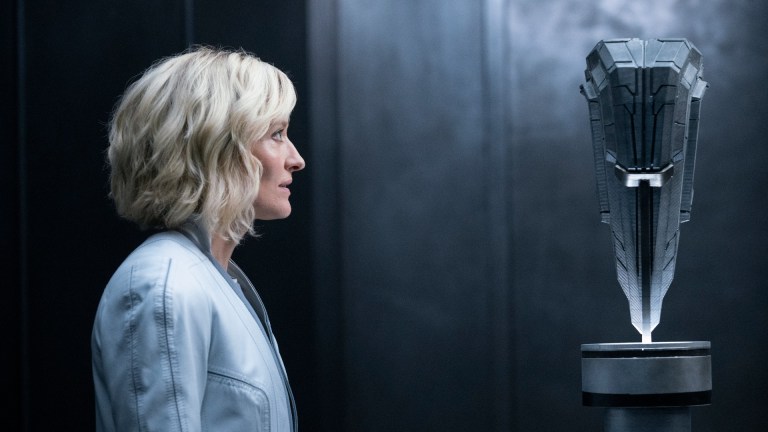Halo Episode 2 Review: Unbound
Master Chief heads off to find a friend as the Halo TV series still tries to find its bearings.

This HALO review contains spoilers.
Halo Episode 2
Halo is starting to find its feet, although the attempt is still a little wobbly. Like a kid trying not to get torn apart in their first MJOLNIR test run. By balancing lore and human interest, “Unbound” ends up in a middle ground that solidifies emotional beats that have previously been read between the lines.
“Unbound” dives into the Master Chief’s history right away. As a younger man, he watched his friend Soren-066 disappear into the night, abandoning the Spartan training that cost him his freedom and some of the use of his arm. In the present day, Soren is on Chief’s mind because now he’s the only other person Chief knows outside the system. Soren is pirate king of the asteroid fortress known as The Rubble. An entertaining flight through an astroid field, cleverly played out mostly without music, brings Chief and Kwan to Soren’s domain.
Meanwhile, Makee convinces her Covenant adopted family (and/or captors) to let her take the lead on the quest to find “the keystone.” That’s the artifact Chief touched in episode 1, and it will lead the Covenant to “the ring.” (That is, of course, the titular Halo super weapon.) Back at the UNSC, Halsey jockeys to keep her Cortana program going, using John’s escape as a convenient example of why the military needs it.
Cortana’s role is perhaps the show’s largest divergence from the games so far. The details of how cloning and AI work in Halo gets a little complicated. So, for the purposes of a recap of a busy episode, permit me to generalize. Instead of an artificial intelligence acting as a living navigational waypoint for Chief, this Cortana is a clone body and AI program designed to “replace” a Spartan’s consciousness, making them both more intelligent and easier to control.
By the end of episode 2, people on both sides of the conflict know the Covenant are looking for a super weapon. Chief learns it from Reth, a man formerly abducted by the Covenant and now in Soren’s hands. While Chief has been spending the episode clearly conflicted about Soren leaving the Spartan life, the intensity of this information and another zap from the artifact sends him scampering back to the only home he’s ever known. Leaving Kwan with Soren, Chief turns himself in to the UNSC. Unknowingly, he’s getting ready for a mind-wipe-flavored date with Cortana.
Halsey as a cold, manipulative mother figure has always been subtext in the Halo extended universe. Like in the show, her Spartans’ attitudes toward her range from hatred to strong affection. One of the most remarkable things about the show so far is how it makes the web of quasi-family relationships explicit. The cut between Chief’s face at the very end and Miranda Keyes’ sets them up as siblings in spirit. Technically, the Cortana system is also a Halsey child, made from her illegally cloned DNA. Chief also has a bit of an older brother dynamic with Kwan, both fostering awkward conversations with her and protecting her. The last conversation between Chief and Halsey in particular is a masterpiece of abusive family loyalty. When Chief goes to Halsey for comfort, she validates his feelings just enough to soften him up before dismissing them again.
Chief is even framed as a child in relation to Soren’s son, Kessler. With that formality and tendency to self-mythologize that kids have, Kessler solemnly plants a smiley face sticker on Chief’s hand. Chief addresses this with the seriousness with which he addresses everything else. That’s a sign that his characterization is solidifying. Even the jokes between him and Kwan work a bit better this episode. But it also seems to say that his mindset is similar to the child’s in other ways, as well.
In contrast is Soren, who along with his role as pirate king also now has a family. All of this comes courtesy of the removal of the “hormonal pellet” Halsey installed in the Spartans to smooth out spikes of emotion that also provide the ability to enjoy anything. While the other Spartans stomp around, Bokeem Woodbine as Soren wears the remnants of his MJOLNIR armor like they weigh nothing at all. That’s an intentional choice, I’m sure, and his performance generally shows a layered mix of energy and sadness. His bitter smile in response to Chief leaving the Rubble, in particular, spoke volumes, especially after his conversations about who Chief wants to be foregrounded the show’s central question.
Kwan continues to be compelling, too. Admittedly, this is a franchise for which I’m primed to like the audience surrogate character, but so far Yerin Ha’s performance is convincing even when, like in this episode, she isn’t given a lot to do. The revelation that just about everyone out in the galaxy is out to kill her doesn’t pan out yet. It will in future, though, as we’re also introduced to resistance leader and possible UNSC plant Vinsher Grath executing prisoners while warbling a little self-composed poem.
The Rubble is a classic, decent space opera setting, distinguishing itself with the vacuum version of a mine car thrill ride. The episode sags in the middle a bit, though. I found myself hoping for more action in the meeting with Reth, while also reluctant to wish that on the depiction of Soren’s “refuge”-slash-jail for junkies and PTSD sufferers. Maybe some of the blame rests on Chief’s fellow Silver Team Spartans. They’re still a bit indistinguishable, and don’t wear their clunky armor as naturally as Pablo Shreiber does. Pedro Pascal in The Mandalorian still takes the prize for that, and one could probably make some kind of social commentary about the differences and similarities between the two franchise’s masked men.
But the Halo TV show is much more morally complicated than Star Wars usually is. That ambiguity is summed up wonderfully in Natascha McElhone’s performance as Halsey, whether she’s smirking at Paragonsky or keeping her face carefully blank as Chief walks by in handcuffs. The UNSC may have put Vinsher in place just as Halsey took advantage of Chief’s betrayal to get Cortana back on the playing field. Some of that ambiguity makes the show feel slack, though; Makee in particular is commanding in one moment and vulnerable the next without a good sense of what her dynamic with her Prophets actually is. The first two episodes feel like they marked a base line for who most of these characters are. The lack of screen time for Kwan, though, means it may have to scramble to catch her up with all of the UNSC intrigue.
